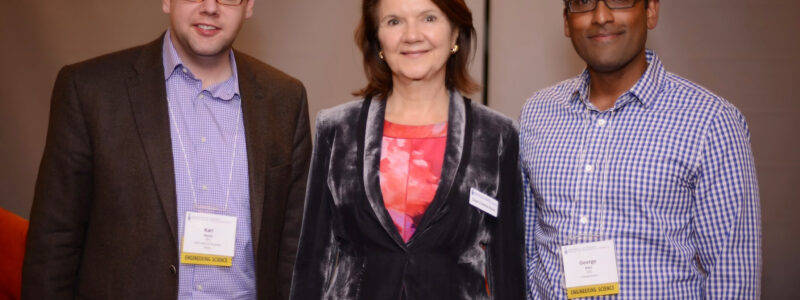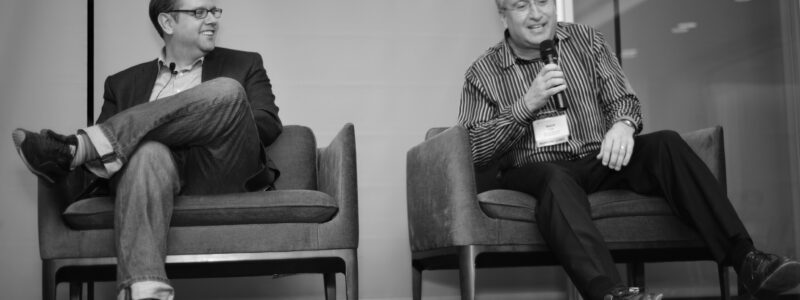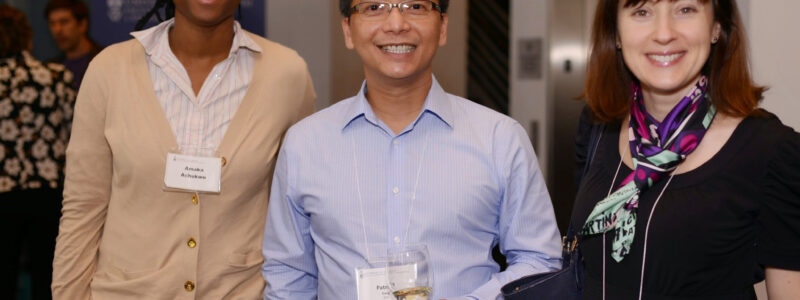March 2, 2015
Karl Martin (EngSci 0T1, ECE MASc 0T3, PhD 1T0) and Foteini Agrafioti (ECE MASc 0T8, PhD 1T0) had two big things going for them: their new start-up company with extremely cool technology, and several potential clients interested in licensing it.
So naturally, they decided to shut down those discussions two years in.
“The number-one thing that helped us was when we decided: all those conversations we’re having about the technology—we’re going to cut them all off,” Martin recounted. “The biggest challenge, I would say, when you’re an entrepreneur and you’re starting something from scratch, is you have certainty around nothing—everything is unknown. We knew we weren’t going to get clarity of direction, but we needed clarity of vision.”
The fledgling entrepreneurs then entered a two-week period of furious do-or die brainstorming on the future of their biometric security IP. The result was a vision for the now-famous Nymi: the world’s first biometric authentication wristband. Nymi solves the everyday problem of providing dozens of passwords, PINs, initials and signatures by using the unique signature of your heartbeat to identify you.
“All our ideas of how to handle persistence and proximity came out of those two weeks, and I attribute it to focus,” said Martin.
Martin recounted the story to fellow alumnus George Babu (EngSci 0T0) last week at The Heart of the Matter: The Future of Wearable Technology, the most recent BizSkule event hosted at Perkins Coie LLP in Palo Alto, California. The BizSkule Speaker Series is presented by Bennett Jones.
Their conversation touched on how to find one thing to do well, the threat of giant multinational corporations moving into the wearable space, and the merits of running a tech start-up in Toronto versus moving it to Silicon Valley.
“I moved my start-up to the Valley…and we know we have very opposing views on this!” said Babu. “My opinion is that capital finds good deals, anywhere,” said Martin. “I think sometimes we use it as an excuse when people fail to raise money in Toronto…I think good deals find money. No VC, no angel investor, would have invested in us during those first two years—down here or anywhere.”
When the discussion turned to opportunities made possible by the Internet of Things, wearables expert and CEO of Linear Dimensions Semiconductor David Schie (EngSci 9T6) joined the panelists on stage.
“People are getting tired of their wearables and throwing them into a drawer because there’s a barrier right now,” said Schie. “The next generation of devices is going to be more about measuring blood pressure, hydration, more diagnostics.”
All three agreed that one area in need of development is making power supplies match the size and strength of the chips they run—finding something much smaller and longer-lasting. “This is actually a case of hardware leading software,” said Shie. “There’s a piece missing in Silicon Valley at the moment,” agreed Martin.
From smart pillows to connected jewelry, wearable technology is on the brink of a major breakthrough into mainstream consumer products. As for Nymi, Martin can’t wait for the day he can raise his wrist to the scanner to pay for his morning coffee.
“The value for the consumer is when you can use this for multiple things,” he says. “This problem of having to take all these actions to access your accounts and make trusted transactions transcends everything.”
View and download pictures from the event.
More information:
Marit Mitchell
Senior Communications Officer
The Edward S. Rogers Sr. Department of Electrical & Computer Engineering
416-978-7997; marit.mitchell@utoronto.ca


